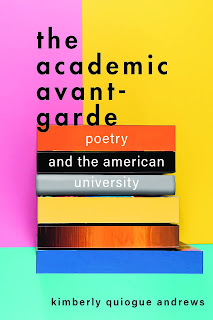 A Brief History of Fruit, winner of the Akron Prize for poetry, and BETWEEN, winner of the New Women’s Voices award.
A Brief History of Fruit, winner of the Akron Prize for poetry, and BETWEEN, winner of the New Women’s Voices award.
She applied the "Page 99 Test" to her new book, The Academic Avant-Garde: Poetry and the American University, and reported the following:
Page 99 of The Academic Avant-Garde contains a break that moves the reader from the second to the third section of my chapter on Jorie Graham and the work of teaching. The end of the section (at the top of the page) reads as follows:Visit Kimberly Quiogue Andrews's website.
“The freedom, in other words, comes from speaking a private language. The pleasure comes from giving that language away.”
That’s how I describe the peculiar situation of being an “experimental” creative writer: on the one hand, you retain a degree of autonomy by producing relatively hermetic work—work, that is, that isn’t beholden to market expectations. On the other hand, though, you still need readers, and of course there’s always pleasure in the idea that others are reading your writing, even if (or maybe particularly when) it’s very difficult. So the “private language” of avant-garde literature is always, one way or another, giving itself away, and that dynamic—particularly the way it structures the interplay between poets who work in the university and the critics that are often just down the hall from them—informs the entirety of The Academic Avant-Garde. So the top of the page absolutely passes the test.
The rest of the page delves a little more deeply into the particular contradiction of teaching at the university level, which is both the thing that buys many writers the chance to write while also (a) taking time away from writing (this is why professors, despite the job title, complain so much about teaching) and (b) forcing one to “disclose” the tricks of the trade. I don’t really deal with this specific matter anywhere other than this chapter, and if one were to only read this page, they might get the impression that the book is entirely about creative writing pedagogy. But there’s a focus on labor, here, that underlies how the book itself is organized. “Teaching,” the page says, “is very obviously labor in the traditional sense” because “it is a specific service done for a wage”—this is why “it is the [type of academic work] that feels the most like work.” The rest of the book deals with activities that feel less like waged work: reading and research. Nevertheless, these too are part of the job, and they all find their way into American avant-garde poetry as that poetry gets written more and more under the auspices of that very job.
--Marshal Zeringue



